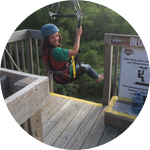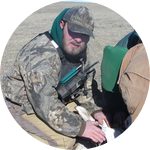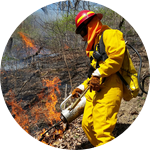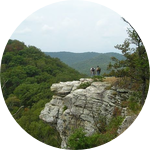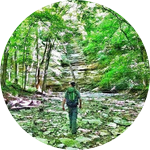About This Project
Our research will use southern flying squirrels (SFS) and their ectoparasites to evaluate potential relationships between parasite loads, sex, and body morphology. Our research will provide the first evaluation of the diversity of ectoparasites in SFS populations, several of which are known to harbor bacterial agents leading to human illnesses (e.g., Sylvatic typhus). Our results may assist with geographic prioritization of SFS conservation efforts, particularly across Midwest landscapes.
Ask the Scientists
Join The DiscussionWhat is the context of this research?
Potential effects of parasites on host populations depend on a variety of factors including variability in parasitism among sex and age classes within host populations. Among mammals, breeding efforts by larger-bodied males often are more energetically demanding and stressful than to females, thereby predisposing males to increased rates of infection by ectoparasites (parasites that live on the outside of the host). Effects of ectoparasites vary, though include transmission of pathogens that include sylvatic typhus (a bacterial infection that involves contact with southern flying squirrels [SFS] and their ectoparasites followed by secondary transmission to humans). Thus, SFS are excellent organisms to evaluate hypotheses related to host-parasite relations across Illinois landscapes.
What is the significance of this project?
Our research will provide the first evaluation of the diversity of ectoparasites in southern flying squirrels (SFS), some of which may harbor bacterial agents for human illnesses (Lyme disease, Sylvatic typhus, Rocky Mountain spotted fever). Increased knowledge of ectoparasite infection and fitness consequences for host organisms may assist with geographic prioritization of wildlife conservation efforts, particularly across the Midwest where SFS disease dynamics may differ from areas characterized by higher quality habitat. Our assessment of parasite-host interactions is important given that predicted range expansion of SFS may predispose northern flying squirrels to greater risk of infection with parasites, thereby negatively affecting future conservation of these species.
What are the goals of the project?
This overall goal of our study is to collect baseline data on parasite-host interactions in southern flying squirrel populations. Because of the unique landscape characteristics (e.g., high forest fragmentation) across the Midwest region, population and disease dynamics of southern flying squirrels across Illinois may vary relative to other landscapes characterized by more contiguous forests. Our specific project objectives include determining diversity of ectoparasites and disease vectors in southern flying squirrels, and investigating potential effects of sex and body morphometrics (e.g., mass, skull length) on ectoparasite loads in southern flying squirrels.
Budget
Primary budget needs for this project include support for Sherman traps and associated materials (soft wire, lag screw eyes, paracord, 2x4s), nest box supplies (wood, wood screws, wire mesh, hinges), and travel to and from our research sites. Previous funding support was provided by Western Illinois University and the Alice L. Kibbe Field Station to investigate survival, home range use, and nest site selection by southern flying squirrels. Support for our proposed research is critical to our larger goal of continuing long-term monitoring of southern flying squirrel populations across west-central Illinois.
Endorsed by
Meet the Team
Affiliates
Affiliates
Affiliates
Affiliates
Christopher N. Jacques
My current research is focused on the study of vertebrate population ecology at three scales of study, including spatial requirements of individuals, population-level dynamics, and community/landscape-level dynamics. At each of these scales, I work collaboratively with university, state, and federal conservation organizations across the Midwest, Intermountain West, and southeastern United States on the development and evaluation of quantitative, field, and laboratory methods to address applied conservation issues. My research has focused largely on ungulate ecology and management, though has expanded in recent years to include additional vertebrate taxa (e.g., mesocarnivores, waterfowl, small mammals) to address priority management and conservation issues. Additionally, my students and I also focus on integrating infectious disease ecology with intensive field studies to elucidate mechanisms that underpin spatial and temporal responses of terrestrial vertebrates to harvest strategies, natural and human-induced disturbances across Midwestern landscapes, predator-prey dynamics, and ultimately the factors regulating population growth.
South Dakota State University, Ph.D., Wildlife and Fisheries Sciences, 2007
South Dakota State University, M.S., Wildlife and Fisheries Sciences, 2001
University of Maine, B.S., Wildlife Ecology, 1995
Mary Beth Scheihing
I am a full time graduate student studying biology at Western Illinois University. I am a teaching assistant during the school year and have worked as a research assistant over the summer. My thesis project examines the effects of prescribed burning on vegetation dynamics, along with the subsequent impacts it has on tick abundance. For this project, I will also be using PCR to detect the presence of Borellia sp. in ticks collected.
I am currently working on a second research project that evaluates the effects of sex and body size on ectoparasite load of southern flying squirrels. While working on this project, I have gained experience trapping and handling small mammals.
As a research assistant at the Alice L. Kibbe field station. I have gained experience collecting freshwater mussels in the Mississippi River for a long term study; experience identifying saplings and herbaceous vegetation; and I also have assisted with collecting, sorting and weighing leaf litter for a gastropod study and for examining fuel loads. I have a variety of research interests, but I am most fascinated in the ecological relationships between plants, arthropods,and zoonotic diseases.
Sean E. Jenkins
My primary research interests lie within the field of landscape ecology, specifically in the effects of fire and other disturbances on the spatial demography of overstory tree species. I am particularly interested in what roles the historical fire regimes, subsequent fire suppression and reintroduction of prescribed fire have played and continue to play in the regeneration dynamics of hardwood trees, especially oaks, and in the overall species diversity of both the overstory and groundflora components of Midwest savanna, grasslands and related communities. I have a wider area of interest in the ecology of forested, grassland and wetland ecosystems, specifically in the role of disturbance and management in influencing population dynamics of both floral and faunal components of these ecosystems.
University of Missouri-Columbia, Ph.D., Forest Ecology, 1997
Eastern Illinois University, M.S., Environmental Biology 1989
Eastern Illinois University, B.S., Environmental Biology, 1987
Will Rechkemmer
My thesis research examines the effects of fall and spring fires on hardwood regeneration and groundflora diversity. This is part of a long term study at the site examining different burning regimes on oak ecosystems. Along with my thesis research I am currently involved in many research projects including population ecology research of Southern Flying Squirrels, population ecology research of Bobcats, Asian carp research, prescribed fire effects on ticks and gastropods, oak regeneration research in Iowa and mussel sampling on the Mississippi River. Through this research I have gained experience in a variety of areas including; trapping/handling of large and small mammals, collection methods for ticks and gastropods, various plant community sampling methods and designing/implementing new research. My main research interests are the effects of disturbances (e.g., wildfire, prescribed fire, invasive species) on floral and faunal communities.
Lab Notes
Nothing posted yet.
Project Backers
- 2Backers
- 2%Funded
- $56Total Donations
- $28.00Average Donation
